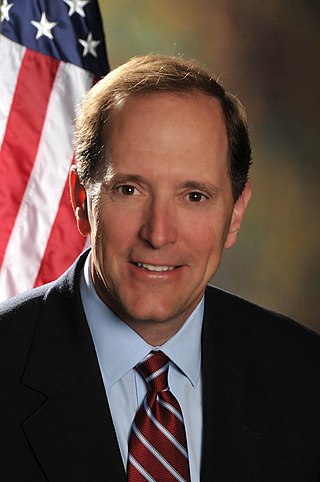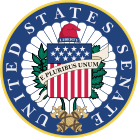
The Social Security Act of 1935 is a law enacted by the 74th United States Congress and signed into law by US President Franklin D. Roosevelt. The law created the Social Security program as well as insurance against unemployment. The law was part of Roosevelt's New Deal domestic program.

Medicare is a federal health insurance program in the United States for people age 65 or older and younger people with disabilities, including those with end stage renal disease and amyotrophic lateral sclerosis. It was begun in 1965 under the Social Security Administration and is now administered by the Centers for Medicare and Medicaid Services (CMS).

Russell Billiu Long was an American Democratic politician and United States Senator from Louisiana from 1948 until 1987. Because of his seniority, he advanced to chairman of the Senate Finance Committee, serving for fifteen years, from 1966 to 1981, during the implementation of President Lyndon Johnson's Great Society and War on Poverty programs. Long also served as Assistant Majority Leader from 1965 to 1969.

Fortney Hillman Stark Jr., known as Pete Stark, was an American businessman and politician who was a member of the United States House of Representatives from 1973 to 2013. A Democrat from California, Stark's district—California's 13th congressional district during his last two decades in Congress—was in southwestern Alameda County and included Alameda, Union City, Hayward, Newark, San Leandro, San Lorenzo, and Fremont, as well as parts of Oakland and Pleasanton. At the time he left office in 2013, he was the fifth most senior Representative, as well as sixth most senior member of Congress overall. He was also the dean of California's 53-member Congressional delegation, and the only openly atheist member of Congress.

John Elmer Linder is an American politician who was a member of the United States House of Representatives from 1993 to 2011. His district was numbered the 4th from 1993 to 1997, the 11th from 1997 to 2003, and the 7th from 2003 until 2011. He is a member of the Republican Party.

The Committee on Ways and Means is the chief tax-writing committee of the United States House of Representatives. The committee has jurisdiction over all taxation, tariffs, and other revenue-raising measures, as well as a number of other programs including Social Security, unemployment benefits, Medicare, the enforcement of child support laws, Temporary Assistance for Needy Families, foster care, and adoption programs. Members of the Ways and Means Committee are not allowed to serve on any other House Committee unless they are granted a waiver from their party's congressional leadership. It has long been regarded as the most prestigious committee of the House of Representatives.

The Children's Health Insurance Program (CHIP) – formerly known as the State Children's Health Insurance Program (SCHIP) – is a program administered by the United States Department of Health and Human Services that provides matching funds to states for health insurance to families with children. The program was designed to cover uninsured children in families with incomes that are modest but too high to qualify for Medicaid. The program was passed into law as part of the Balanced Budget Act of 1997, and the statutory authority for CHIP is under title XXI of the Social Security Act.

Willis David Gradison Jr. is an American politician from Ohio who served in the United States House of Representatives from 1975 to 1993.

The United States Senate Committee on the Budget was established by the Congressional Budget and Impoundment Control Act of 1974. It is responsible for drafting Congress's annual budget plan and monitoring action on the budget for the Federal Government. The committee has jurisdiction over the Congressional Budget Office. The committee briefly operated as a special committee from 1919 to 1920 during the 66th Congress, before being made a standing committee in 1974.

The Social Security Amendments of 1965, Pub. L.Tooltip Public Law 89–97, 79 Stat. 286, enacted July 30, 1965, was legislation in the United States whose most important provisions resulted in creation of two programs: Medicare and Medicaid. The legislation initially provided federal health insurance for the elderly and for financially challenged families.

The Committee on Energy and Commerce is one of the oldest standing committees of the United States House of Representatives. Established in 1795, it has operated continuously—with various name changes and jurisdictional changes—for more than 200 years. The two other House standing committees with such continuous operation are the House Ways and Means Committee and the House Rules Committee. The committee has served as the principal guide for the House in matters relating to the promotion of commerce and to the public's health and marketplace interests, with the relatively recent addition of energy considerations among them. Due to its broad jurisdiction, it is considered one of the most powerful committees in the House.

A ways and means committee is a government body that is charged with reviewing and making recommendations for government budgets. Because the raising of revenue is vital to carrying out governmental operations, such a committee is tasked with finding the ways and means with which to raise that revenue.
The Joint Committee on Taxation (JCT) is a Committee of the U.S. Congress established under the Internal Revenue Code at 26 U.S.C. § 8001.

The United States budget comprises the spending and revenues of the U.S. federal government. The budget is the financial representation of the priorities of the government, reflecting historical debates and competing economic philosophies. The government primarily spends on healthcare, retirement, and defense programs. The non-partisan Congressional Budget Office provides extensive analysis of the budget and its economic effects. CBO estimated in February 2024 that Federal debt held by the public is projected to rise from 99 percent of GDP in 2024 to 116 percent in 2034 and would continue to grow if current laws generally remained unchanged. Over that period, the growth of interest costs and mandatory spending outpaces the growth of revenues and the economy, driving up debt. Those factors persist beyond 2034, pushing federal debt higher still, to 172 percent of GDP in 2054.

The United States federal budget is divided into three categories: mandatory spending, discretionary spending, and interest on debt. Also known as entitlement spending, in US fiscal policy, mandatory spending is government spending on certain programs that are required by law. Congress established mandatory programs under authorization laws. Congress legislates spending for mandatory programs outside of the annual appropriations bill process. Congress can only reduce the funding for programs by changing the authorization law itself. This normally requires a 60-vote majority in the Senate to pass. Discretionary spending on the other hand will not occur unless Congress acts each year to provide the funding through an appropriations bill.
The history of taxation in the United States begins with the colonial protest against British taxation policy in the 1760s, leading to the American Revolution. The independent nation collected taxes on imports ("tariffs"), whiskey, and on glass windows. States and localities collected poll taxes on voters and property taxes on land and commercial buildings. In addition, there were the state and federal excise taxes. State and federal inheritance taxes began after 1900, while the states began collecting sales taxes in the 1930s. The United States imposed income taxes briefly during the Civil War and the 1890s. In 1913, the 16th Amendment was ratified, however, the United States Constitution Article 1, Section 9 defines a direct tax. The Sixteenth Amendment to the United States Constitution did not create a new tax.

David Lee Camp is a former American politician who served as a member of the United States House of Representatives from 1991 to 2015. Camp represented Michigan's 4th congressional district since 1993, and previously served one term representing Michigan's 10th congressional district. A member of the Republican Party, Camp was chairman of the House Committee on Ways and Means, serving from 2011 to 2015. In March 2014, he announced that he would not run for re-election.
The 2012 United States federal budget was the budget to fund government operations for the fiscal year 2012, which lasted from October 1, 2011 through September 30, 2012. The original spending request was issued by President Barack Obama in February 2011. That April, the Republican-held House of Representatives announced a competing plan, The Path to Prosperity, emboldened by a major victory in the 2010 Congressional elections associated with the Tea Party movement. The budget plans were both intended to focus on deficit reduction, but differed in their changes to taxation, entitlement programs, defense spending, and research funding.
The 2013 United States federal budget is the budget to fund government operations for the fiscal year 2013, which began on October 1, 2012, and ended on September 30, 2013. The original spending request was issued by President Barack Obama in February 2012.
The United States Senate Select Committee on the Tariff Regulation was a Select Committee for the U.S. Senate from February 25, 1823 until March 3, 1923. It is now a defunct congressional committee, having been consolidated into the Committee of Finance in 1923.













